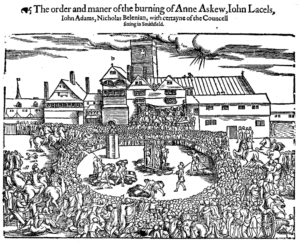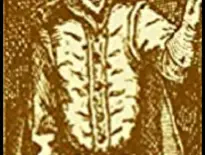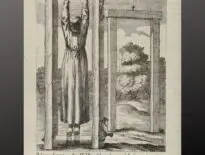 This week's Monday Martyr is John Lascelles (Lassells, Lacels), a courtier who was burnt at the stake for his Protestant faith at Smithfield on 16th July 1546 with priest Nicholas Belenian, tailor John Adams, and famous Protestant martyr Anne Askew.
This week's Monday Martyr is John Lascelles (Lassells, Lacels), a courtier who was burnt at the stake for his Protestant faith at Smithfield on 16th July 1546 with priest Nicholas Belenian, tailor John Adams, and famous Protestant martyr Anne Askew.
Here are some facts about this Henrician Protestant martyr:
- John Lascelles' family came from Gateford in Nottinghamshire. His father was Richard (or George) Lascelles and his mother was Dorothy Sandford.
- He studied law at Furnival's Inn, an inn of the Chancery, before joining Sir Francis Bryan's household in the 1530s.
- In 1538, he was dismissed from Bryan's household due to his evangelical views. His patron, Sir John Henry, appears to have helped Lascelles move into the service of Thomas Cromwell.
- In 1539, he was appointed sewer in King Henry VIII's privy chamber.
- In 1541, his sister, Mary Hall, who had been a member of the Dowager Duchess of Norfolk's household with Queen Catherine Howard, told Lascelles of the queen's former relationships with Henry Manox and Francis Dereham, to whom she lost her virginity. Lascelles informed Archbishop Thomas Cranmer, who, in turn, told the king. An investigation into Catherine's past began and led to the queen's fall and subsequent execution in February 1542.
- In May 1546, Lascelles was arrested and imprisoned in the Tower due to his radical evangelical views. His biographer, Alec Ryrie, explains that he was "denounced as a patron of Richard Laynam, a London prophet who predicted the imminent overthrow of the king" and he was also friends with the outspoken Protestant Anne Askew.
- On 12th July 1546, John Lascelles was tried for heresy. He refused to recant and was sentenced to death.
- On 16th July 1546, Lascelles was burnt at the stake with Protestants Anne Askew, Nicholas Belenian and John Adams. Martyrologist John Foxe wrote of the men's deaths: "It happened well for them, that they died together with Anne Askew: for, albeit that of themselves they were strong and stout men, yet, through the example and exhortation of her, they, being the more boldened, received occasion of greater comfort in that so painful and doleful kind of death; who, beholding her invincible constancy, and also stirred up through her persuasions, did set apart all kind of fear. Thus they, confirming one another with mutual exhortations, tarried looking for the tormentor and fire, which at the last, flaming round about then:, consumed their blessed bodies in happy martyrdom [...]".
- John Lascelles wrote a letter about his views on the Eucharist while he was imprisoned - which you can read here - and ended it with the words: "Now, with quietness, I commit the whole world to their pastor and herdsman Jesus Christ, the only Saviour and true Messiah, and I commend my sovereign lord and master the king's Majesty, King Henry the Eighth, to God the Father, and to our Lord Jesus Christ: the queen, and my lord the prince, with this whole realm, ever to the innocent and immaculate Lamb, that his blood may wash and purify their hearts and souls from all iniquity and sin, to God's glory, and to the salvation of their souls. I do protest, that the inward part of my heart doth groan for this; and I doubt not but to enter into the holy tabernacle which is above, yea, and there to be with God for ever. Farewell in Christ Jesu.
John Lacels, late servant to the king, and now I trust to serve the everlasting King, with the testimony of my blood in Smithfield."
Image: A woodcut of the burnings of Anne Askew, John Lascelles, Nicholas Belenian and John Adams from John Foxe's Book of Martyrs.
Sources
- Foxe, John. Book of Martyrs, p. 210 - https://www.exclassics.com/foxe/foxe210.htm
- Ryrie, A. (2008, January 03). Lassells [Lascelles], John (d. 1546), courtier and religious activist. Oxford Dictionary of National Biography. Retrieved 17 Jul. 2023, from https://www.oxforddnb.com/view/10.1093/ref:odnb/9780198614128.001.0001/odnb-9780198614128-e-68897.



Leave a Reply